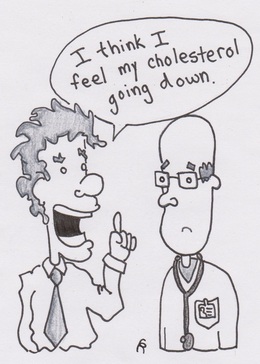
Anything related to diabetes always gets my attention. I tuned in, because someone, somewhere was going to make a decision based on this breaking news, and I wondered how much real information and advice would be included in the report. Not much. The listening audience was told that this warning was something to “keep in mind” or for your doctor to “watch.” Already I sensed predictable confusion. Keep in mind? Have your doctor watch? What was the public supposed to do with that advice?
Human brains are wired to react to stress. The amagdyla, an almond shaped mass located deep within the temporal lobe of our brain, is involved with emotions related to survival. It evolved as a sort of alarm to prevent our prehistoric ancestors from being eaten by tigers. I was guessing that the statin heads-up was stimulating more than one amagdyla to go into overactive mode.
Later, I watch TV coverage. A perky woman with a concerned look reports, “Today the FDA had a big warning.” On another channel, a male reporter adds, “This is a big deal for those who are taking statins.”
Is it? Soon, bespectacled expert, Dr. Steven Nissen, chairman of the department of Cardiovascular Medicine at the Cleveland Clinic speaks to the camera. With his first words he warns about “overreacting.”
Too late! In order to draw in viewers, the language had already been ratcheted up to terror level. At that point, whatever the doctor says will be filtered through fear. The other filter, cynicism, is activated as statistics about statins and how much the drug companies benefit monetarily are flashed on the screen. Nissan’s message is not getting through. His attempts to reassure the public that only “a few people will cross over the threshold to diabetes, and that memory loss is rare and reversible” is being lost.
Then, an attractive, fit newsman enters sharing that he was on statins. “I called my cardiologist and said, ‘Hey, how about if I take a six-month break and have my blood checked twice over the six month period and see what happens?’” Mr. Newsman looks pretty happy about his decision. I notice that nowhere in the conversation does he indicate what his doctor has replied.
Now, Dr. Nissen, who is also a cardiologist, feels some responsibility to point out that if this guy was on statins, there was a reason. As he sees it, Mr. Newsman is at risk. If he stops his statins, he could have a heart attack.
“But what’s the harm of seeing how you feel?” Mr. Newsman asks. Feel? Since when do you feel your cholesterol levels rising? He brags that his numbers are good now, that he exercises and has a good diet. I believe him, and I think the doctor does too. He explains that diet and exercise are recommended for everyone, but those interventions can only lower your levels by 10-15%. He states unequivocally that Mr. Newsman’s cholesterol levels are going to go right back up. Then he delivers his zinger! Dr. Nissen stresses that these drugs reduce the risk of death from heart and stroke by 30%! That’s great news, but it’s lost to a commercial break.
In Your Medical Mind, a book about how we make health related decisions, the authors caution against the old paternalistic way of doing medicine. They suggest that we don’t have to do what doctors say, that our health care specialists might actually have to explain and negotiate. As I listen to the anxious discourse, I wonder how many people have had a satisfying conversation with their practitioner. How many know what their individual risk factors are? Does anyone negotiate?
It’s just a matter of time before a new, scary news report makes you question something that is working to prolong your life. Terrifying tigers are always going to be out there, and we will always react to them. We should. Paying attention is good. So is asking questions. This is about survival, isn’t it? Or, maybe it’s about time – to talk to your doctor about what the real threats are for you. Write yourself a note, so you won’t forget.
http://pharmacologycorner.com/animation-statins-rosurvastatin-simvastatin/
 RSS Feed
RSS Feed
